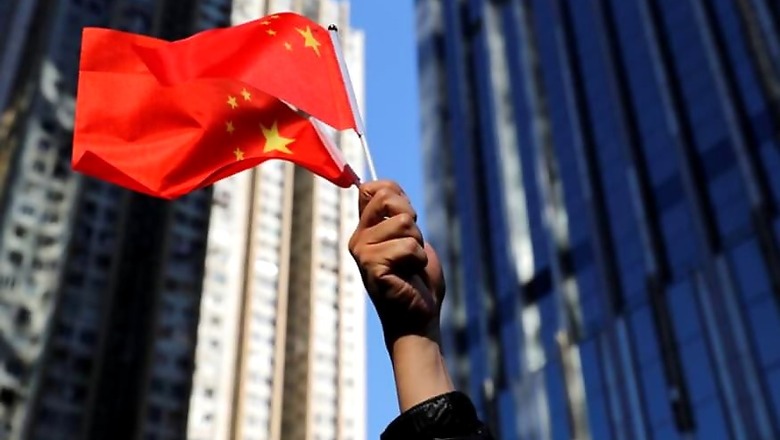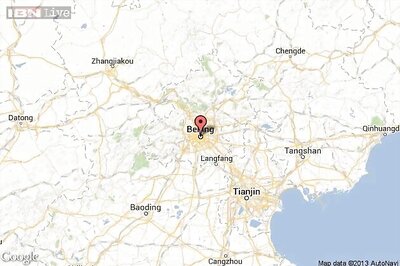
views
As countries struggle to contain the Covid-19 pandemic, tensions are simmering between world leaders and China. China has repeatedly been accused of concealing the magnitude of the novel coronavirus outbreak in the country. China, however, has denied any cover-up and has maintained that it was the first country to report the COVID-19 to the World Health Organisation.
Now, countries across the world are taking measures, ostensibly to counter China's economic and political influence.
India on Saturday revised its Foreign Direct Investment (FDI) policy in order to ensure that foreign companies do not take advantage of the economic slowdown resulting from the global coronavirus pandemic. As per the new policy, "an entity of a country that shares land border with India or where the beneficial owner of investment into India is situated in or is a citizen of any such country can invest only under the government route".
India is not the only country to revise its policies in light of the global coronavirus crisis. In the last few weeks, major global economies, including the European Union and Australia, have implemented measures to safeguard their assets.
European Union Calls for a Coordinated Approach
The European Union Commission, on March 25, released guidelines to coordinate an approach among member states for FDI screening with the aim of protecting important EU assets. The European Commission also urged member states that do not yet have an FDI screening mechanism, or whose screening mechanisms to establish an elaborate screening mechanism and in the meantime, employ all other available options to address cases where a suggested acquisition of a particular business, infrastructure or technology would present a risk to the security or public order in the EU, BloombergQuint reported.
More recently, French President Emmanuel Macronquestioned China's handling of the Covid-19 pandemic and said that there was much the world did not know. In an interview with the Financial Times, Macron said, "We don't know. There are clearly things that have happened that we don't know about."
On being asked whether China’s authoritarian response to reel in the outbreak had brought to fore the weakness of Western democracies, Macron said that Western countries can't abandon their “fundamental DNA” citing a health pandemic. "Given these differences, the choices made and what China is today, which I respect, let's not be so naive as to say it's been much better at handling this," Macron said.
Germany Seeks to Amend German Foreign Trade and Payment Act
The German government, on April 8, set in motion, a legislative process to amend the German Foreign Trade and Payment Act that would allow the government to ‘intervene and open’ a review process even if there’s a ‘probable impairment’ to national security, the Economic Times reported. Previously, ‘actual threat’ had to be established.
German Chancellor Angela Merkel has, however, maintained caution in her response over China’s handling of the situation. Merkel spoke to Chinese President Xi Jinping in March over the coronavirus pandemic and agreed to stay in close contact. “They agreed that the current crisis can only be resolved through close international cooperation,” the German government said in a statement.
Italy Widens Scope of ‘Golden Powers Law’
On April 8, the Italian government widened the scope of the ‘Golden Powers Law’, that is in place to curb foreign investment in sensitive sectors, to incorporate many other sectors, including transport and financial sector.
These changes come even as Italian Prime Minister Giuseppe Conte remained tight-lipped about China’s handling of the situation. In fact, China is among the countries supplying equipment to Italy, which has been severely affected by the infection. However, on being asked about his government’s decision to wait to impose the lockdown, Conte said that the Italian system differed greatly from that of China’s.
"We have a completely different system to China. For us to severely limit constitutional freedoms was a critical decision that we had to consider very carefully…,” he told BBC on April 9.
'Won’t Be Business as Usual’: UK’S Foreign Secretary Dominic Raab on Relations with China
Foreign secretary Dominic Raab recently said that it would not be possible for the UK to back to “business as usual” with China, and added that the international community would be seeking answers from China about its handling of the Covid-19 crisis, Financial Times reported.
“We ought to look at all sides of this and do it in a balanced way, but there is no doubt we can’t have business as usual after this crisis,” Raab said on being asked about the impact of the crisis on the UK’s relations with China.
“I think there absolutely needs to be a very, very deep dive after-the-event review of the lessons, including of the outbreak of the virus,” Raab added.
US President Trump Warns China of Consequences
US President Donald Trump on Saturday warned China that it should face consequences if it was "knowingly responsible" for the spread of the novel coronavirus, upping the ante on Beijing over its handling of the COVID-19 pandemic, AFP reported.
"If they (China) were knowingly responsible then there should be consequences. You're talking about, you know, potentially lives like nobody's seen since 1917," Trump said on Saturday.
Earlier, Trump had said that his government was trying to ascertain if the coronavirus originated from a lab in Wuhan, while Secretary of State Mike Pompeo asked Beijing to “come clean” about the information, Reuters reported. Trump has also criticised China for being “very secretive” about sharing information about the coronavirus outbreak that has claimed over one million lives so far. Trump had added that the world would have been better equipped if Beijing had given them an “advance warning”
"China was very secretive (on coronavirus). Very, very secretive. And that's unfortunate," he said.
Dollar Threshold for FDI Screening Will be Zero Dollars: Australia
Amid the pandemic, the Australian government is coming down heavily on Chinese state-owned firms that may be looking closely at ailing local businesses. Treasurer Josh Frydenberg announced that there would be a zero dollar approval threshold for all proposed FDI investments, Daily Mail reported.
‘Rename WHO as Chinese Health Organisation’: Japan Criticizes UN Body
Japan’s Deputy Prime Minister Taro Aso slammed WHO and said it should be renamed the “Chinese Health Organisation”. He alleged the UN body of siding with China over the coronavirus pandemic.
Speaking at the Japanese parliament in Tokyo, Aso critcised WHO chief Tedros Adhanom Ghebreyesus for what he termed as “inadequate evaluation to address the coronavirus outbreak“.
“Early on, if the WHO had not insisted to the world that China had no pneumonia epidemic, then everybody would have taken precautions,” he said.













Comments
0 comment